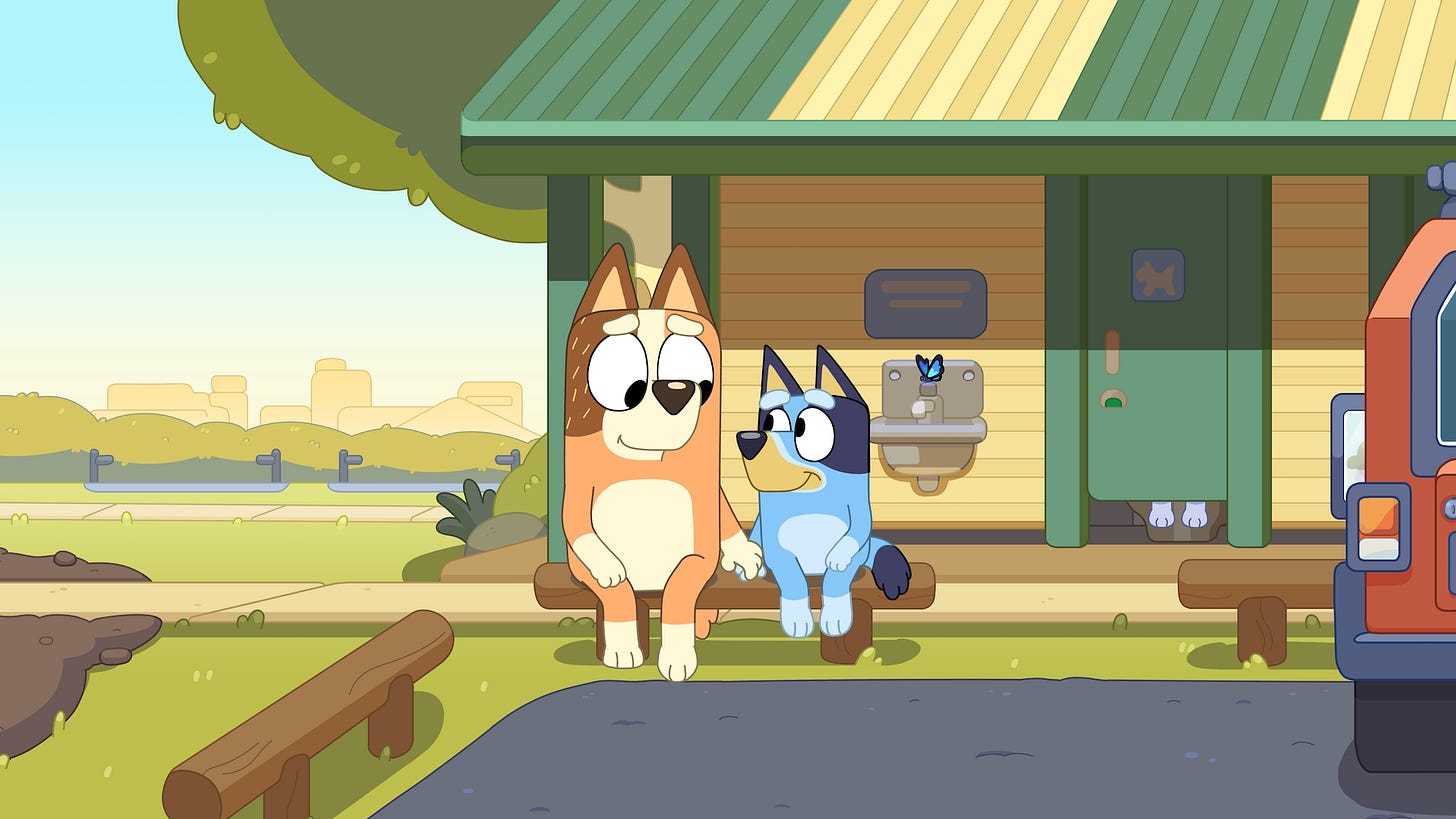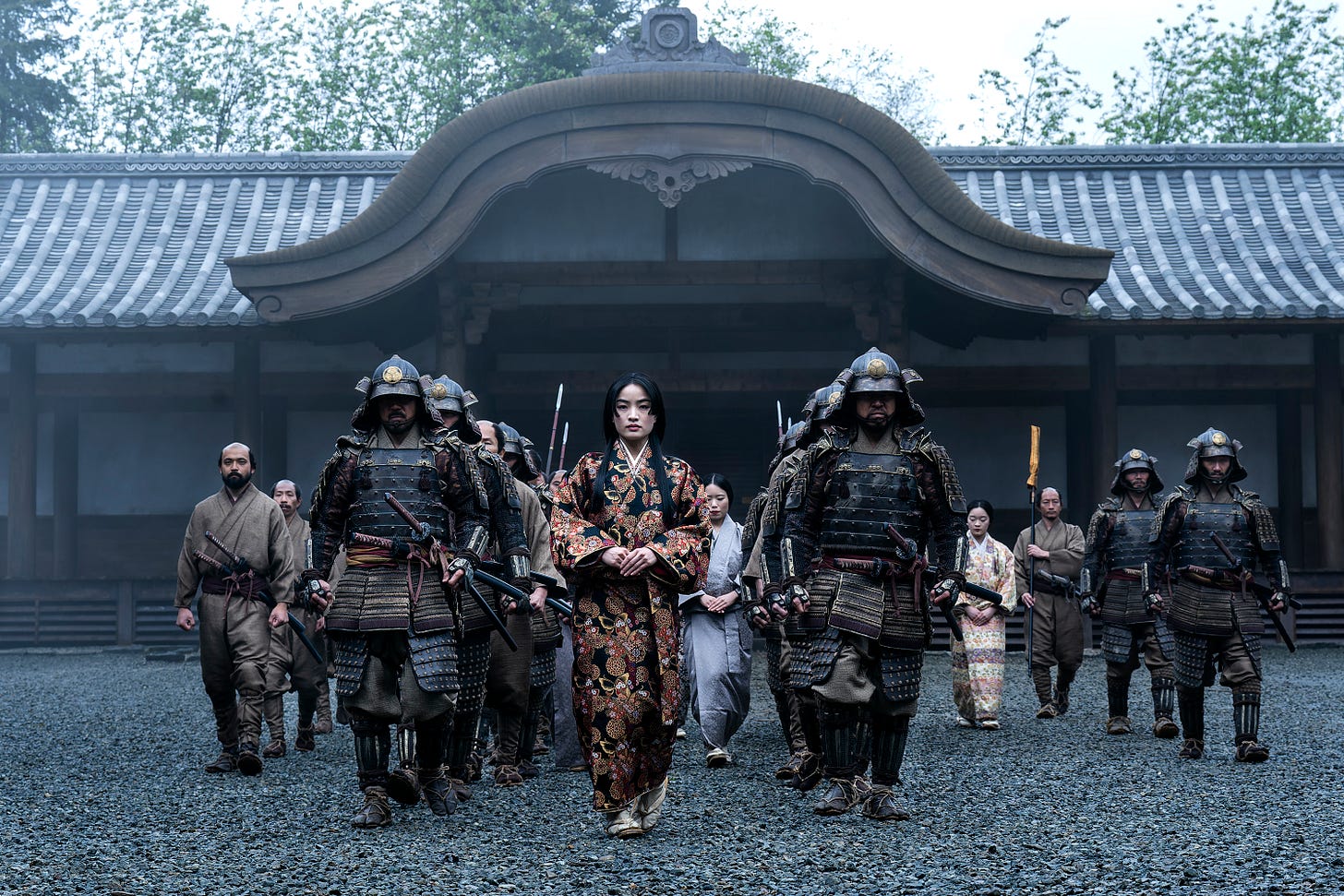Is 'Bluey' bowing out or not?
Plus, 'Under the Bridge,' 'X-Men 97,' the Knicks create a weird 'Sopranos' epilogue, and more
This week’s What’s Alan Watching? newsletter coming up just as soon as I get to ride in the front seat…
I saw “The Sign”
It’s taken four years, but I finally got permission to go wildly off-brand for Rolling Stone to write a full-length essay about one of my favorite shows, Bluey. (Previously, I was able to slip it onto a couple of lists, including the best shows of 2020 and the best sitcoms of all time.)
The occasion for this was Sunday’s debut of “The Sign,” a super-sized episode where Bluey and her family had to brace for a move away from their home in Queensland. So my column is both an overall appreciation of the absolute brilliance of the series — aimed at preschoolers, but resonant to many, many age groups — and a discussion of the special itself. Specifically, there was some ambiguity going into last weekend about whether “The Sign” was meant as the Bluey series finale, so I wrote a lot about why that might be, whether the episode works better as a finale or just another episode in an ongoing show, etc. Since then, there have been various reports that yet another episode — called, appropriately, “Surprise” — will begin streaming this weekend. That would be the 50th episode in a season that was announced to be 50 episodes long, so it makes sense. But we’ll have to see whether that is meant as the true end of the show — some kind of sweet coda to the drama of “The Sign,” like how Abbey Road follows “The End” with “Her Majesty” — or if one of the most popular series on the planet will just keep going, no matter how much older the girls who play Bluey and Bingo sound.
Odds and/or ends
After being pretty dismissive of X-Men 97 a few newsletters back, I stuck with it at the urging of one of my kids, and have been pleasantly surprised. I’m a week behind, but last week’s episode — adapting a story from Grant Morrison’s early 2000s comics run — was fantastic. It even accomplished a miracle of miracles: it made me actually like and care about Gambit for the first time since the character first appeared in the ‘90s.
Nearly a decade after the first season of The Jinx came to a jaw-dropping conclusion with Robert Durst seeming to confess to three murders on a hot mic, the HBO docuseries is back for a second season. But as I discuss in my review, without Durst’s active participation, without nearly as many hidden details in this phase of the story, and without any acknowledgment or discussion of the controversies surrounding Season One, the new episodes play as an awkward, much less compelling victory lap.
As Lily Gladstone’s first major project since Killers of the Flower Moon, and as Riley Keough’s first since Daisy Jones & The Six, I had high-ish hopes for Hulu’s Under the Bridge, a true crime miniseries based on Rebecca Godfrey’s acclaimed non-fiction book about the 1997 murder of a Canadian teenager. Unfortunately, as I elaborate in my review, Gladstone and Keough’s presence is a double-edged sword: they’re terrific, but the relationship between their characters (Keough playing Godfrey, Gladstone as a fictional cop) consumes so much oxygen that the victim and her killers don’t get fleshed out nearly as much as the show needs them to be to justify spending eight hours to tell this story.
As I think I’ve mentioned, ER has been my recent treadmill binge. Some weeks, I bounce around, and recently went through the series’ pilot, which remains an utterly perfect episode of television. At others, I go consecutively through the post-Peter Benton seasons, when my viewing was much spottier during the original run. I’m almost midway through Season 10, and it’s been funny to watch a pair of new characters introduced that season: Coop, a talented and charismatic doctor played by Glenn Howerton, and Morris, an utter screwup played by Scott Grimes. The early episodes play out in a way suggesting Coop will become a significant character, while Morris will quickly wash out once everyone recognizes how thoroughly incompetent he is. Instead, Morris stuck around for the rest of the series, while Coop vanished, unmentioned after the infamous (but at times very exciting) episode when the second helicopter comes for its revenge against Rocket Romano. Though maybe it worked out better for everyone in the end: while Morris was annoying for a long time, the show gave him an impressive redemption arc in the final seasons, and Howerton wouldn’t have been available to do It’s Always Sunny in Philadelphia if he was playing Coop at that time.
I made a guest appearance on the Parks and Recollection podcast, hosted by actor Jim O’Heir and former Parks and Recreation writer Greg Levine. I felt pleased that the episode I was asked to discuss was “Halloween Surprise,” not only because it concludes with the utterly lovely scene where Ben proposes to Leslie, but because I got to discuss it with the man who played fart attack victim Garry Gergich.
Tony lives! But the Knicks’ dream of LeBron died
While the Bluey article contained the most Sepinwall sentence I’ve ever written (you’ll know it when you see it), the most Sepinwall-targeted piece of content ever created by someone else finally surfaced this week, when Pablo Torre’s podcast unearthed the long-rumored, never-before-seen recruitment video that the Knicks made for LeBron James in 2010. It is a video that includes a Sopranos scene where Jim Gandolfini and Edie Falco play Tony and Carmela, three years after the series ended. The Torre video is long, but I’ve cued it up to around the first Sopranos clip:
Given the intersection between my beloved Sopranos and my beloved Knicks, I had no choice but to write many hundreds of words about this weirdness, and about how it might (but probably won’t) change anyone’s mind about what happens in the final scene of the show.
Shōgun recaplet: “Crimson Sky”
The Shōgun finale comes out next week. I’ll be writing a long post-mortem analysis piece for Rolling Stone, so I don’t want to fire off too much of my ammunition before that. That said, the penultimate episode, “Crimson Sky,” deserves at least a mention here, because it is an extraordinary for both the character of Lady Mariko and the performance of Anna Sawai.
Though Blackthorne and Toranaga are arguably the story’s two protagonists, Mariko has been the emotional heart of the miniseries, and never more than here. Trapped in Ishido’s palace, surrounded by hostile soldiers and her former best friend, Mariko somehow dominates every situation, getting everything that she wants — particularly the honorable death she has wanted so desperately for so long. Her husband denied her of it, and Toranaga did previously. But in this circumstance, her death becomes a powerful weapon for Toranaga, since it only reinforces his message that Ishido is keeping powerful families prisoner within his palace, and further encourages other houses to peel away from Ishido and towards Toranaga. When Mariko stands against the barricaded door, waiting for Ishido’s soldiers to blow it up, she looks not only relieved to finally be released of the burden of a dishonorable life, but pleased that her death will also do so much good for her lord. As she so eloquently puts it earlier to Ochiba, "Accepting death isn't surrender. Flowers are only flowers because they fall."
Tremendous episode. Tremendous series. Much more talk next week.
That’s it for this week! What did everybody else think?






Shogun is so freaking good, and I hope that Anna Sawai gets recognized this awards season and gets more leading roles going forward (I know she is in Monarch where they don't ask much of her), as she was breathtaking in this episode.
The show had me tricked. I thought for sure that she was going to commit seppuku, and when she didn't I was relieved, even though I expected her to die. Then I realized that there were 8 or so minutes left in the episodes, where we get to see her earn her desired honorable death What a great show and great actress. I can't wait for the finale to cap off a great series, although I will be sad that Mariko-sama isn't in it.
I know I'm broken record on this, but the Bluey Covid discussion in the article reminded me of one of my Covid watches which fills a similar niche: a show aimed at children/families that is absolutely amazing. I am talking, of course, about the animated miniseries "The Long Long Holiday". It was on Netflix at the time but has since moved to Apple. If Bluey is The Sopranos of children's television, The Long Long Holiday is the Band of Brothers of children's television :-)
It skews older than Bluey (maybe 8+) and just has so many bits in it that simply amaze you that they put them in a show primarily aimed at kids. It's one of those shows that - unlike Bluey - sadly I find very few have seen it, but everyone I've talked into giving it a go has really liked it.